Registration is now open for the CLIR’s fall 2022 events, including the DLF Forum, taking place in Baltimore, Maryland, this October:
We’re pleased to announce the keynote speakers for all of our events:
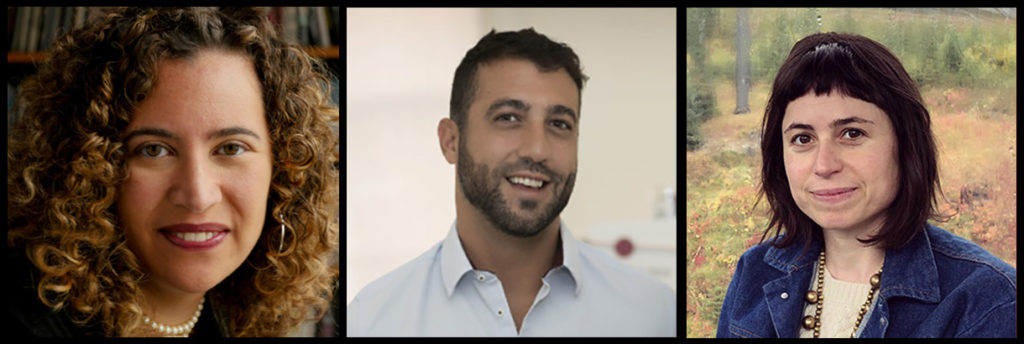
DLF Forum keynote speakers Meredith Broussard, David Nemer, and Sara Mannheimer
David Nemer, assistant professor of media studies at the University of Virginia, will be in conversation with Meredith Broussard, associate professor of data journalism at New York University. Sara Mannheimer, associate professor and data librarian at Montana State University, will moderate the discussion.
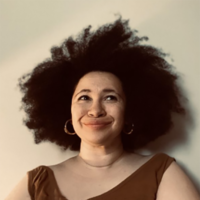
Dorothy Berry will open NDSA’s Digital Preservation 2022 with the keynote address, “Keeping Whose History, For Whom: Writing the Stories Digital Preservation Tells.” In July, Berry will start her new professional role as digital curator at the National Museum of African American History and Culture in Washington, DC, having served as digital collections program manager at Harvard University’s Houghton Library for the past four years.
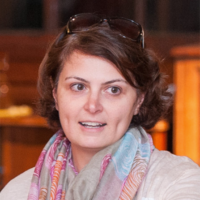
Michelle Caswell will open the Digitizing Hidden Collection Symposium with the keynote, “‘So That Future Organizers Won’t Have to Reinvent the Wheel’: Activating Digital Archives for Liberatory Uses.” Caswell is associate professor of archival studies in the Department of Information Studies at the University of California, Los Angeles.
Secure the early bird rate, register for Learn@DLF workshops, book your hotel, browse our new community-written Baltimore local guide, and start planning for yet another memorable week with CLIR. DLF member organizations receive one complimentary DLF Forum registration as part of their member benefits. Not sure who received your code? Email us at forum@diglib.org.
Learn more about these events and keynotes on the DLF Forum Blog, and learn more about our Covid-19 health protocols here. Questions may be directed to forum@diglib.org.
Want to stay updated on all things #DLFforum? Subscribe to our Forum newsletter and follow us at @CLIRDLF on Twitter.
CLIR has issued a call for proposals (CFP) for its “Pocket Burgundy” publication series. The series invites proposals on topics reflecting current concerns in the information and cultural heritage community and will award $2,500 for successful proposals.
Launched last year, the series welcomes ideas on topics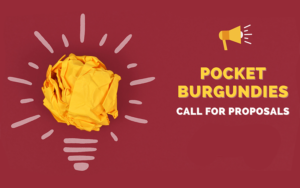 relating to traditional areas of CLIR publication—digital libraries, preservation, emerging technologies, and trends in information use—as well as proposals on topics in the information field(s) relating to social and racial justice, labor, intersectionality, accessibility, sustainability, building and maintaining community, working with culturally sensitive materials and marginalized groups, decolonizing the field(s), and the climate crisis. A list of projects awarded in 2021 is available here.
relating to traditional areas of CLIR publication—digital libraries, preservation, emerging technologies, and trends in information use—as well as proposals on topics in the information field(s) relating to social and racial justice, labor, intersectionality, accessibility, sustainability, building and maintaining community, working with culturally sensitive materials and marginalized groups, decolonizing the field(s), and the climate crisis. A list of projects awarded in 2021 is available here.
Reports will be limited in length to 50 pages and will include executive summaries and visual elements to facilitate access and navigation. All reports will be released in electronic form only and will be freely available on CLIR’s website.
The newly named editorial committee consists of:
Proposals are due September 28, 2022, and decisions will be announced in December 2022. Projects will begin no earlier than January 1, 2023, and complete drafts must be submitted to CLIR by December 8, 2023. More information, including the CFP, link to the application form, and FAQ is available at https://www.clir.org/pocket-burgundies/.
In May 2022, CLIR hosted its first in-person program-related meeting since March 2020: a symposium for former recipients of the CLIR-Mellon Fellowships for Dissertation Research in Original Sources. Titled “Looking Forward to the Past,” the symposium’s call invited former fellows to reflect upon their fellowship experiences and to share their insights into the future of global archival research.
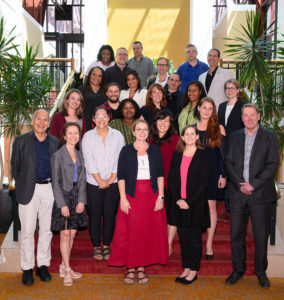
Between 2002 and 2019, the generous support of the Mellon Foundation enabled CLIR to award fellowships annually to scholars in the humanities and humanistic social sciences who conducted sustained periods of archival research, consulting rare and unique materials of all kinds around the world. CLIR received nearly 7,000 applications from graduate students enrolled in universities across the United States and awarded 258 fellowships through this program, which was particularly well suited to students engaged in broad comparative and transnational research and to those working with materials in multiple languages and a wide variety of contexts. Fellows visited over 1,750 research sites in 86 countries and 42 U.S. states, including libraries and archives of all types and sizes, museums, galleries, private collections, media organizations, and more, working with a vast array of materials. The artifacts the fellows studied spanned thousands of years in time and included nearly every conceivable type of original source material: rare books, manuscripts, printed records, artworks, archaeological artifacts, maps, musical scores, photographs, audio and audiovisual recordings, films, and ephemera.
The schedule for the event opened with a “virtual kickoff” consisting of a full day of online discussions and presentations from former fellows. Following, CLIR hosted three days of activities for 54 fellows and guests at the St. Louis Union Station Hotel.
Director of Global Strategic Initiatives Nicole Ferraiolo led the planning and organization of the symposium and afterwards reflected, “Fellows and staff alike shared that they left the meeting feeling more energized and connected than they have in a long time, and I know I feel similarly.”
Participants responding to a survey about the event echoed these sentiments while acknowledging that the experience of reflecting on the program had been bittersweet. CLIR’s program is sunsetting at the same time as other longstanding programs supporting graduate students in the humanities, including the Social Science Research Council’s International Dissertation Research Fellowships and the American Council of Learned Societies Dissertation Completion Fellowships. With fewer funding opportunities for students outside their universities, working for sustained periods with original sources simply will not be possible for many of them, diminishing the scope and scale of their research projects. One former fellow wrote, “Future scholars will not be able to ask (or answer) long-term research questions or use comparative methods. This is going to be crippling to the humanities.” Another lamented, “We’re losing one of the sole transnational research support systems for early scholars, and one that actually values experimentation and understands setbacks from its recipients. It’s a huge loss.”
Over the coming months, CLIR will be working with fellows on a publication compiling the papers and ideas that came out of the symposium, and offering suggestions and recommendations for ongoing support and programming for future graduate students doing archival research.
CLIR president Charles Henry, who gave opening and closing remarks at the St. Louis event, observed, “It’s been a tremendous privilege to work with this community of creative scholars over the past two decades. What they have shared with us about the profound and unpredictable nature of archival research has shaped CLIR’s strategy and deepened our commitment to cultivating trustworthy learning infrastructures and interdependent relationships between collecting organizations around the world.”
A new DLF working group focusing on supporting archives and technology workers, management, and leadership will hold its first public meeting via Zoom on Tuesday, June 28, 2022, at 11am PST/12pm MST/1pm CST/2pm EST.
The conveners of the group, Technology Strategy for Archives (TS4A), envision that this community of practice will:
TS4A is open to anyone interested in these topics regardless of formal role, experience, or institutional affiliation; those who are not associated with a DLF member institution may still join TS4A. Participants are encouraged to bring strategic challenges and other topics from their own institutions to assist with their own local planning.
The initial meeting will solicit interest and input on future directions for the group. To attend, register here.
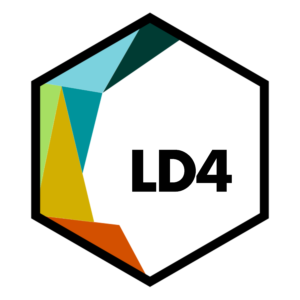 CLIR welcomes LD4 Community (LD4) as its newest affiliate. LD4 is a community for linked data practitioners to foster broad adoption and sustained support of linked data efforts in libraries. The group’s work is facilitated by a Steering Committee, Conference Organizing Committee, Code of Conduct Committee, and a series of self-defined Affinity Groups uniting interest in discrete topics.
CLIR welcomes LD4 Community (LD4) as its newest affiliate. LD4 is a community for linked data practitioners to foster broad adoption and sustained support of linked data efforts in libraries. The group’s work is facilitated by a Steering Committee, Conference Organizing Committee, Code of Conduct Committee, and a series of self-defined Affinity Groups uniting interest in discrete topics.
Among the community’s major forums and activities is an annual, open conference. The 2022 LD4 Conference, “Linking Global Knowledge,” will be held virtually July 11-15. More information and a link to register are available here.
CLIR will serve as financial host for the LD4 Community. More information on CLIR Affiliates can be found here.
Don’t miss the eighth and final podcast episode of the HBCU Library Alliance Tour! In this episode, we visit Fisk University in Nashville, Tennessee, a town known as the cradle of student protest. Assistant director of library services DeLisa Minor Harris provides a stunning overview of Fisk University’s enduring activist legacy—from the 1800s, when the Jubilee Singers brought international attention to the Negro spiritual, to the civil rights work of Diane Nash, John Lewis, and others. The tradition of protest continues today among students and alumni organizers and activists with the Black Lives Matter Movement.
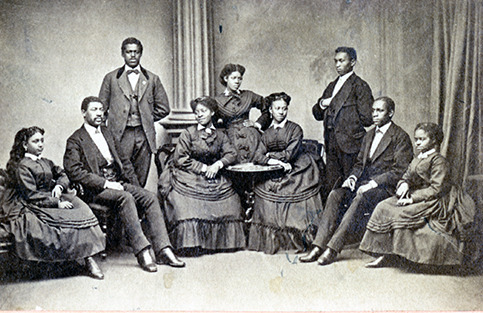
“The spiritual really became a recognized form of music through formerly enslaved people who were able to bring it to an audience and really capture their hearts and capture their emotions.”
—DeLisa Minor Harris
In season 3, host Sharon M. Burney takes us on a tour of six HBCU libraries, highlighting the people and collections, and giving us a glimpse into the vital role these institutions play in their communities. If you haven’t yet tuned in, we hope you’ll join us—especially if you have your own road trip planned this summer!
ISSN 1944-7639
Content is not copyrighted and can be freely distributed

Council on Library and Information Resources
1800 Diagonal Road, Suite 600
Alexandria, VA 22314
contact@clir.org
CLIR is an independent, nonprofit organization that forges strategies to enhance research, teaching, and learning environments in collaboration with libraries, cultural institutions, and communities of higher learning.
Unless otherwise indicated, content on this site is available for re-use under CC BY-SA 4.0 License